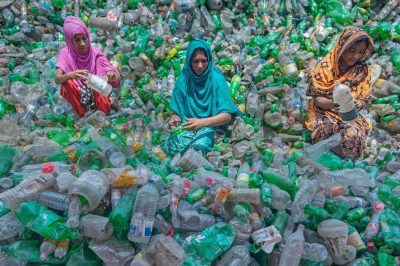Plastic pollution has become a major environmental disaster on a global scale, and Pakistan is no exception. According to a recent United Nations Development Program (UNDP) assessment, Pakistan faces a monumental burden, generating approximately 20 million tons of solid trash each year, with plastic materials accounting for 5 to 10% of total waste. The critical need for comprehensive action to stop plastic pollution in Pakistan and protect the nation’s natural resources is highlighted by this terrible number.
The UNDP research provides light on the enormity of Pakistan’s plastic pollution problem. With an ever-increasing population and rapid urbanization, single-use plastic usage has skyrocketed, adding considerably to the plastic waste catastrophe. Plastic debris can be seen clogging up streets, rivers, and even lonely wilderness regions, from bustling cities to far-flung villages. Public health, wildlife, and marine life are all seriously endangered by this pervasive pollution, which also detracts from the nation’s visual splendor.
Plastic pollution has an especially negative impact on Pakistan’s marine ecosystems because of its long coastline and various bodies of water. Discarded plastic objects, such as bags, bottles, and microplastics, end up in waterways, posing a serious threat to marine life. The consumption of plastic waste can have catastrophic effects on turtles, dolphins, and seabirds since they frequently mistake it for food. In addition, marine food chains and biodiversity are impacted by the disruption of aquatic ecosystems caused by plastic garbage.
Plastic pollution has far-reaching environmental and human health impacts. Plastics endure in the environment for hundreds of years before they can be broken down, releasing dangerous compounds into the air, water, and soil. These toxins can leak into food, eventually making their way into the human food chain and causing long-term health problems. Furthermore, improper disposal of plastic garbage, which is frequently burned at open-air dumps, emits hazardous pollutants into the air, increasing air quality and respiratory problems.
Taking Care of the Crisis
Pakistan must use a multifaceted strategy that incorporates public awareness efforts, governmental measures, and sustainable practices to prevent plastic pollution. The following actions can be taken:
Tight Legislation: Pass and enforce tight rules governing the manufacture, use, and disposal of single-use plastics. To discourage plastic pollution, impose fines and penalties for noncompliance.
Waste Management: Invest in effective waste management systems that place a premium on recycling and waste reduction. To encourage appropriate disposal, establish collection and recycling facilities across the country.
Encourage the Use of Eco-Friendly Alternatives: Encourage the use of environmentally friendly alternatives to single-use plastics, such as reusable bags, containers, and packaging materials.
Education and Awareness: Initiate extensive public education programs to inform the public of the negative consequences of plastic pollution and the significance of responsible consumption and disposal.
Corporate Responsibility: Work with many sectors of the economy to reduce plastic packaging, promote sustainable behaviors, and support the circular economy.
Research and Development: Invest in research and development to find long-term solutions for plastic waste management, such as biodegradable plastics and sophisticated recycling technology.
Also Read: Pakistani Salt Shines at HCMC FOODEX 2023
Pakistan’s plastic pollution challenge requires immediate attention and coordinated action from all facets of society. Pakistan must give top priority to methods that will minimize plastic usage and effectively manage plastic trash since its distinctive natural beauty and diversified ecosystems are at risk. Pakistan can pave the way for future generations to live in a cleaner, healthier, and more sustainable world by enacting strict legislation, increasing public awareness, and supporting sustainable activities.
IT/Telecom Marketing Specialist.







